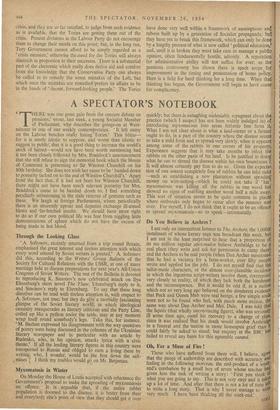Through the Looking Glass
A. Sofronov, recently returned from a trip round Britain, emphasised the great interest and tireless attention with which every word uttered by Soviet writers is greeted.' A. Sofronov did this, according to the Writers' Group Bulletin of the Society for Cultural Relations with the USSR, at one of many meetings held to discuss preparations for next year's All-Union Congress of Soviet Writers. The rest of the Bulletin is devoted to reproducing K. Simonov's now celebrated attack on Ilya Ehrenburg's short novel The Thaw, Ehrenburg's reply to it, and Simonov's reply to Ehrenburg. To say that these long diatribes can be read with tireless attention is, with respect to A. Sofronov, not true; but they do giVC a morbidly fascinating glimpse of the Soviet literary world, in which ideological casuistry masquerades as literary criticism and the Party Line, coiled up like a python under the table, may at any moment wrap itself round somebody'l legs. Take this, for instance. M. Bazhan expressed his disagreement with the way questions of poetry were being discussed in the columns of the Ukrainian literary newspaper and in particular with an article by Rudenko, who, in his opinion, attacks lyrics with a civic theme,' If all the leading literary figures in this country were transported to Russia and obliged to earn a living there by writing, who, I wonder, would be the first down the salt- , mines '/ I think my roubles would go on Mr. Betjeman.










































 Previous page
Previous page